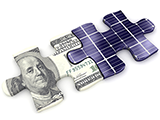

There are a variety of financing options and strategies that organizations can pursue to facilitate their renewable energy project’s deployment. It is necessary to understand and evaluate the different financing structures that are available to determine the most appropriate strategy.
Third-party financing is a well-established financing solution in the United States, having emerged in the solar industry as one of the most popular methods of solar financing. Third-party solar financing predominantly occurs in two forms: solar leases and power purchase agreements (PPAs). In the lease model, a customer signs a contract with an installer/developer and pays for the use of a solar system over a specified period of time, rather than paying for the power generated. In the PPA model, the solar energy system offsets the customer’s electric utility bill, and the developer sells the power generated to the customer at a fixed rate, typically lower than the local utility.
Below are resources to help you understand third-party ownership financing structures as a means to facilitate your solar project development.
| Using Power Purchase Agreements for Solar Deployment at Universities (pdf) | The National Renewable Energy Laboratory's fact sheet provides guidance to universities on the process of using PPAs and how PPAs can make economic sense for campus solar deployment. This document can support university stakeholders charged with the financial planning of campus solar projects. |
| Solar Power Purchase Agreements | A solar power purchase agreement (SPPA) is a financial arrangement in which a third-party developer owns, operates, and maintains the photovoltaic (PV) system, and a host customer agrees to site the system on its property and purchases the system's electric output from the solar services provider for a predetermined period. Explore this Green Power Partnership webpage to find out how SPPAs work, the benefits and challenges, and other useful information and resources. |
| Solar Power Purchase Agreements: A Toolkit for Local Governments | Designed to overcome the common challenges and costs associated with SPPAs, the Interstate Renewable Energy Council's comprehensive toolkit provides a full suite of legal resources and related documents in a user-friendly format. |
| PV Development Considerations for U.S. Universities | This presentation facilitated through the Solar University Network outlines critical solar development considerations for colleges and universities. These include structuring solar development teams, best practices and rules of thumb for PV development, university financial options for PV investment, and best practices for PV procurement. |
| Third Party Solar PV Power Purchase Agreement (pdf) | This map of the United States shows which states and territories authorize the third-party PPAs for solar PV, which includes at least 28 states (plus Washington, D.C., and Puerto Rico). This map and information are provided as a public service and do not constitute legal advice. |
| Solar Power Purchase Agreement | This SPPA template document was developed by a group of solar developers, law firms, and other interested parties in the solar energy space. It represents a consensus around one possible approach to solar finance, with a particular emphasis on access to the broader capital markets. To use this content, you should review it in the context of your personal business strategy. |

A renewable energy certificate (REC) is a tradeable, market-based instrument that represents the legal property rights to the “renewable-ness”—or all non-power attributes—of renewable electricity generation. A REC can be sold separately from the actual electricity (kilowatt-hour, or kWh). The REC owner has exclusive rights to make claims about “using” or “being powered with” the renewable electricity associated with that REC. A REC is issued for every megawatt-hour (MWh) of electricity generated and delivered to the electric grid from a renewable energy resource.
If you own the RECs associated with your renewable energy project’s electricity output, you can sell these RECs to another party. In doing so, you forfeit the ability to make any claims about “using” renewable energy, but generate a new revenue stream. The revenue is a function of the system’s kWh output and the market price of RECs.
Organizations engaged in a PPA may choose to sell the RECs associated with the on-site solar PV system and in their place buy RECs sourced from other geographically eligible green power resources in order to make environmental claims. This process is referred to as REC arbitrage (pdf) and allows the site host to capture the financial benefits of solar RECs while also making environmental claims and meeting the Green Power Partnership's requirements.
Below are resources to help you understand REC monetization strategies and how RECs may impact the financing and economics of your project development.
| PJM Environmental Information Service (EIS) “How Do I Sell RECs?” Web Page | Short step-by-step guide on how to sell RECs generated by projects within the PJM footprint. |
| Renewable Energy Certificate (REC) Arbitrage (pdf) | Describes green power procurement strategy used by electricity consumers to simultaneously decrease the cost of their renewable electricity use and substantiate renewable electricity use and carbon footprint reduction claims. |
| New England Power Pool Generation Information System (NEPOOL GIS) Bulletin Board | Bulletin board listing RECs for sale by NEPOOL GIS account holders. |
| PJM Generation Attributes Tracking System (GATS) Bulletin Board | Bulletin board listing RECs for sale by PJM GATS account holders. |